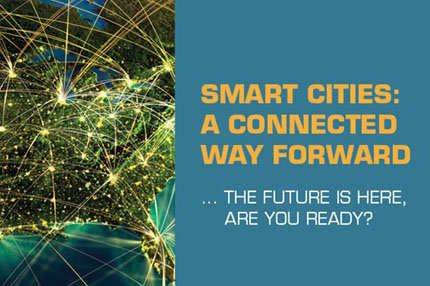
A seismic change is taking place with city planning as smart grids, autonomous vehicles and other innovative mobility services draw closer to becoming commonplace. The upcoming “Smart Cities: A Connected Way Forward” symposium will cover the latest developments that local governments should be following, and what adjustments should be made to infrastructure and land-use plans.
“Connected and autonomous vehicles, smart grids, changing urban demographics, and the collection and use of big data – these are a few of the things that are changing our cities and transportation infrastructure,” said WCC President Dr. Rose B. Bellanca. “These changes are going to impact us in the same why that mass produced automobiles impacted society 100 years ago. It’s going to take long-range planning, systems-thinking and cross-collaboration between business, government and education to ensure we build cities that are livable, workable and sustainable for everyone.”
The one-day event will be held on the campus of Washtenaw Community College in Ann Arbor, Michigan, on Friday, April 6. A full agenda and registration is available at wccnet.edu/smart-cities.
The sessions developed for the event are intended for city, county and state planners and engineers; city managers; county administrators; mayors; economic development leaders; information technology directors; public works directors; transportation experts and business/industry representatives.
Five hour-long sessions are planned, each led by subject matter experts. The agenda also includes a mid-day lunch and a wrap-up “Smart Cities in Action” panel discussion. Topics include (find full descriptions at wccnet.edu/smart-cities):
SMART VEHICLES IN A SMART WORLD
Presenter: Dr. Ken Washington, Vice President of Research and Advanced Engineering and Chief Technology Officer at Ford Motor Company
Topic: Find out where technology is driving us from one of the world’s leading electrification, autonomous vehicle and mobility companies.
SOCIETY 2030 DEMOGRAPHICS
Presenter: Dr. Toni Antonucci, Professor of Psychology and Senior Research Scientist at the University of Michigan Institute for Social Research Life Course
Topic: What city planners and stakeholders need to know about changing demographics and the impact it will have on our infrastructure.
SMART CITIES: THE OS FOR PROSPERITY AND INCLUSION
Presenter: Paul Krutko, President and CEO of Ann Arbor SPARK
Topic: Find out how technology and big data are making cities more sustainable, prosperous, and inclusive.
THE SMART GRID: ENERGY INFRASTRUCTURE PLANNING AND INITIATIVES
Presenter: Camilo Serna, Vice President of Corporate Strategy at DTE Energy
Topic: Learn how energy companies can play a major role in planning and developing smart city infrastructures.
VISION, PLANNING AND INITIATIVES AT MDOT
Presenter: Kirk Steudle, P.E., State Transportation Director at Michigan Department of Transportation
Topic: What things are happening around smart city infrastructure with regard to MDOT, and what does that look like for the future?
SMART CITIES IN ACTION PANEL: IMPLEMENTATION AND VISION
Panelists: Dr. James R. Sayer, Director of University of Michigan Transportation Research Institute; Craig Hupy, Public Service Area Administrator for the City of Ann Arbor; Eugene W. Grant, Mayor of Seat Pleasant, Maryland
Topic: Learn how cities prepare, design and implement data-driven approaches to improve infrastructure.
The event will also include an exhibit hall, which opens along with registration at 8:30 a.m. and again during lunch. All presentations will take place in Towsley Auditorium, inside the Morris Lawrence Building at WCC (campus map).
The cost of the symposium is $60, which includes lunch. For more information, visit wccnet.edu/smart-cities, email [email protected] or call 734-973-3704.
Tags: 2018, Smart Cities, Smart Vehicles, ousearch_News_2018
